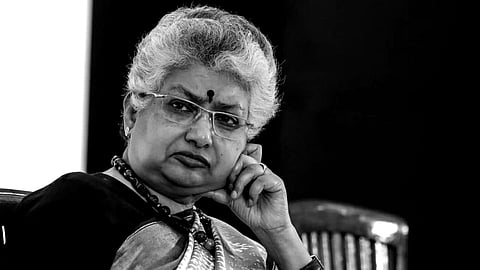

JUSTICE B.V. NAGARATHNA, a Supreme Court judge and member of the collegium, has strongly opposed the recommendation to appoint Chief Justice of Patna High Court, Vipul Manubhai Pancholi, as a judge of the Supreme Court of India, according to a report by Hindustan Times. The Supreme Court has not issued any statement denying the report.
Although Justice Nagarathna requested that her note of dissent be uploaded on the Supreme Court’s website, in line with the Court’s recent emphasis on transparency and publishing Collegium decisions, the Supreme Court administration, led by Chief Justice of India B.R. Gavai has not yet made it public. Moreover, the statement issued on the Court’s website yesterday regarding the recommendation to appoint two judges to the Supreme Court was conspicuously silent on the dissent.
In her dissent, as reported by Hindustan Times, Justice Nagarathna stated that Justice Pancholi’s appointment to the Supreme Court would be “counterproductive” to the administration of justice and could put the credibility of the Collegium system at stake.
Referring to Justice Pancholi’s transfer from the Gujarat High Court to the Patna High Court in 2023, Justice Nagarathna noted that it was not a routine transfer but followed careful deliberation at the highest levels. She called for the confidential minutes of the 2023 transfer to be perused.
Justice Nagarathna also highlighted the all-India seniority of judges, noting that Justice Pancholi ranks 57th among High Court judges nationwide. In her assessment, several more senior and meritorious judges from various High Courts could be considered ahead of him.
She further pointed out that the Gujarat High Court is already represented on the Supreme Court by Justices J.B. Pardiwala and N.V. Anjaria.
Appointing a third judge from the same High Court, according to Justice Nagarathna, would skew the balance when many High Courts remain unrepresented or underrepresented.
Notable dissents in the Collegium
Dissent within the Collegium is rare, as decisions are typically made by consensus. However, there have been notable instances of dissent in recent years.
Justice Jasti Chelameswar, when he was a member of the Collegium headed by then-Chief Justice T.S. Thakur, insisted on transparency and objectivity in the appointment process, boycotting collegium meetings and demanding circulation of decisions.
Justice Rohinton Nariman blocked Collegium resolutions for Supreme Court judge appointments for 22 months until his retirement, advocating for the appointment of Justices Abhay S. Oka and Akil Kureshi.
In October 2022, Justices D.Y. Chandrachud and S. Abdul Nazeer objected to the method of appointing judges to the Supreme Court through circulation during the tenure of Chief Justice U.U. Lalit. Consequently, CJI Lalit shelved the proposal to appoint the then-Punjab and Haryana High Court Chief Justice Ravi Shankar Jha, Patna High Court Chief Justice Sanjay Karol, Manipur High Court Chief Justice P.V. Sanjay Kumar, and senior advocate K.V. Vishwanathan. Later, Justice Karol and senior advocate Vishwanathan were appointed to the Supreme Court when Justice Chandrachud became Chief Justice.
In 2023, Justice K.M. Joseph had expressed reservations about the appointment of Justice Aravind Kumar, Chief Justice of the Gujarat High Court, suggesting his name could be considered at a later stage.
Permissibility of dissent within the Collegium
As per the judgment in the Third Judges case (1998), if two judges in the Collegium express strong objections with cogent reasons against the appointment of a particular person, the Chief Justice of India should not press for such an appointment.
This means that in a 3:2 decision, the collegium cannot recommend the name, but in a 4:1 decision, the resolution can be passed.
The Leaflet reported yesterday that Justice Pancholi’s elevation would supersede as many as 21 Chief Justices whose initial appointments as High Court judges predate Justice Pancholi’s.
Currently, the Supreme Court has no judges from the High Courts of Jharkhand, Orissa, Jammu and Kashmir, Ladakh, Uttarakhand, Meghalaya, Sikkim, or Tripura.
Justices Aparesh Kumar Singh and Dhiraj Singh Thakur, currently Chief Justices of the Telangana and Andhra Pradesh High Courts, respectively, hail from the Jharkhand and Jammu and Kashmir High Courts. Both are senior to Justice Pancholi.
Justice Sangam Kumar Sahoo of the Orissa High Court is also senior to Justice Pancholi. No information is available in the public domain explaining why the Collegium chose to over represent states already represented on the Supreme Court bench instead of ensuring representation for all High Courts.
The Bombay, Punjab and Haryana, and Allahabad High Courts each have three judges on the Supreme Court bench. If Justices Alok Aradhe and Vipul Pancholi are appointed, the Madhya Pradesh and Gujarat High Courts will also have three judges each on the Supreme Court.
The Karnataka and Madras High Courts each have two judges on the Supreme Court bench.
The Calcutta and Rajasthan High Courts have only two judges each, while the High Courts of Himachal Pradesh, Telangana, Patna, Chhattisgarh, Gauhati, Andhra Pradesh, Manipur, Delhi, and Kerala have one judge each on the Supreme Court bench.
The Leaflet yesterday reported that transparency in Collegium resolutions has remained a longstanding problem. During the tenure of former CJI D.Y. Chandrachud, collegium resolutions elaborated numerous considerations such as regional, caste and gender diversity, alongside seniority of judges. While Collegium resolutions during the tenure of CJI Sanjiv Khanna became more terse, they continued to highlight considerations such as seniority of the judges. The Collegium’s statement under CJI Gavai detailing the appointments of Justices Aradhe and Pancholi reveals even less, providing no reasoning either regarding diversity considerations or seniority. This may be viewed as the Collegium reverting to a system of opacity.
The Campaign For Judicial Accountability And Reforms (CJAR), in its statement, issued today has condemned the lack of transparency in the functioning of the Collegium. It said that the statement issued by the Supreme Court on August 25 makes a mockery of the earlier resolutions with respect to standards of transparency in judicial appointments.
It has demanded reasons for the recommendation to elevate Chief Justice Pancholi to be disclosed while making the dissent of Justice Nagarathna public.